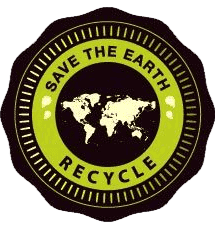The term “municipal solid waste” may not be familiar to you, however what it is most certainly will be. MSW is simply the term used to describe trash/garbage/junk – the stuff you throw away in the kitchen, in your bathroom, in the garage, etc. MSW encompasses product packaging, consumable goods (egg cartons, juice containers, grass clippings, old furniture, ruined clothes, bottles, moldy food and so on) as well as things like old batteries, kitchen appliances, paint cans and more. On average, the United States of America produces around 250,000,000 tons, or 502,000,000,000 pounds, of garbage every year. Of this massive amount of garbage, roughly 90 million tons are composted (when it comes to organic materials like old fruit and grass) or recycled (plastics, rubbers, metals etc) – or about 35% of our waste is used for something other than going straight to landfill.
The EPA website on Non-Hazardous Waste suggests a number of household practices that reduces the amount of waste your household generates, whether that’s through waste prevention, your own composting, or standard recycling (toss your bottles in the recycle instead of garbage!). The primary waste reduction methods are broken into three main categories:
- Source Reduction: create less waste in the first place. Buy used items such as clothing, furniture and electronics. This saves money and reduces the amount of materials required to produce new things. Buy products that minimize their packaging. Buy reusable items vs. disposable (batteries, tupperware vs sandwich bags, silverware vs plastic utensils, etc). Maintain your belongings – fixing a leaky tire vs replacing it reduces the amount of rubber in our recycling plants. Borrow items that you won’t need constantly such as birthday decorations or automotive tools.
- Recycle: very simple and extremely effective. Simply sort your trash while you’re throwing it away. Get a separate container for waste vs recyclables like plastic or glass bottles. Recycle everything you possible can such as old egg cartons, milk crates, juice bottles, almost all plastic packaging, paper and plastic grocery bags, etc. Recyclable items are sent to special facilities where a large portion of the materials used in the production are able to be re-used for future uses. Recycling alone is one of the biggest ways to help reduce the amount of garbage you alone generate. If everyone on Earth took the effort to recycle instead of throw away, we would see a massive boost in renewable resources.
- Composting: Organic waste like yard trimmings, fruit peels and rinds take up a large volume of waste that gets sent to landfill. By starting up your own home compost pile you’re reducing the amount of junk you’re hauling off to the landfill as well as creating your own natural fertilizer which is great for your yard. You’ll save money on fertilizer, help your plants grow, and reduce the amount of compost friendly garbage our waste management facilities have to deal with.
For more news and information regarding waste management and the environmental impacts of proper garbage disposal, visit EagleDumpsterRental.com.
